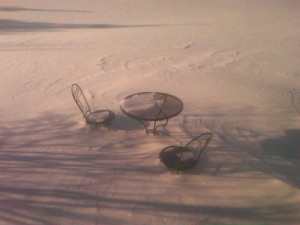Lately I have been thinking about the dreaded Lake Effect. Those of us who live near the Great Lakes know what the Lake Effect means. Once a storm passes through an area, it goes on over the lake and picks up more moisture. The storm then swings back around and dumps twice as much snow in a half amount of time. Normally a storm pattern comes from the West and goes to the East. But Lake Effect will go in a reverse order. The heaviest snows I have experienced have been due to Lake Effect. The snow falls in huge clumps rather than flakes. I always hold my breath when we get storms, to see if it ends up having a “Lake Effect.” If Lake Effect is forecasted, it is best not to make any plans. One can go from clear skies to complete white out in a matter of minutes.
I remember seeing cars drive off the highway and into the swamp across the street from my old neighborhood. Driving through white out and thick snow, it is hard to distinguish the actual road from a field. These cars could only be excavated several days later.
The Lake Effect principle is in a way like Tsunamis. The trauma begins with an earthquake. Everyone then waits to see if it will trigger a tidal wave. The Tsunami is always more devastating than the original quake. We have seen this happen recently in Japan. Not only a few buildings were rattled but entire towns wiped out and bodies forever lost and swept out to sea.
So in other words, a storm is not over – until it is over. We must be vigilant for what type of “Lake Effect” or fall out that might occur.
Lake Effects and Tsunamis are like the challenges that we encounter in life. This is particularly true when we are trying to get on our feet after a fall. We have to brace ourselves for setbacks. It is only par for the course. It is not being pessimistic. It is being practical. If one has ever struggled from an addiction, one knows that relapse is common. From the perspective of drug rehabilitation, it is even part of the recovery process. The popular Stages of Change Model by Prochaska and DiClemente even factors in relapse. This is because so many people have a tendency to fall back into their old patterns and ways of doing things. Rather than getting discouraged, one works to anticipate relapse and how to implement lasting change. One can take the backsliding experience and use it to grow stronger. It is a grace to grow from our mistakes. And with God’s help we can do it.
The real danger with any “Lake Effect” is the eroding of a person’s confidence. If a person doesn’t realize that relapse is normal, they might give up and descend into even worse patterns.
From a spiritual point, “Lake Effect” is relevant too. In Matthew 12:43-45:
When an unclean spirit goes out of a person it roams through arid regions searching for rest but finds none. Then it says, “I will return to my home from which I came.” But upon returning, it finds it empty, swept clean, and put in order. Then it goes and brings back with itself seven other spirits more evil than itself, and they move in and dwell there; and the last condition of that person is worse than the first.
In Friday’s Scripture reading we have the old Bible story of King David getting into trouble with Bathsheba, the wife of Uriah the Hittite. What does he do about his mistake? Instead of coming clean, he deepens his sin by purposefully getting Uriah killed.
We can see that even King David, the guy who had a pure heart for God, fell into deep trouble. It is common to fall. What is more difficult is being able to pick oneself up after a fall and to learn to grow from it. Psalm 51 is the hymn of repentance that is attributed to King David:
Have mercy on me, O God, in your goodness; in the greatness of your compassion wipe out my offense. Thoroughly wash me from my guilt and of my sin cleanse me.
These are the beautiful words of a contrite heart. In the Catholic Church we have a sacrament for repentance known as Confession or the Sacrament of Reconciliation. It is reconciliation because it repairs one’s relationship to God.
For most of us, recovering from relapse is like doing laundry. We have to get ourselves clean on a regular basis!

